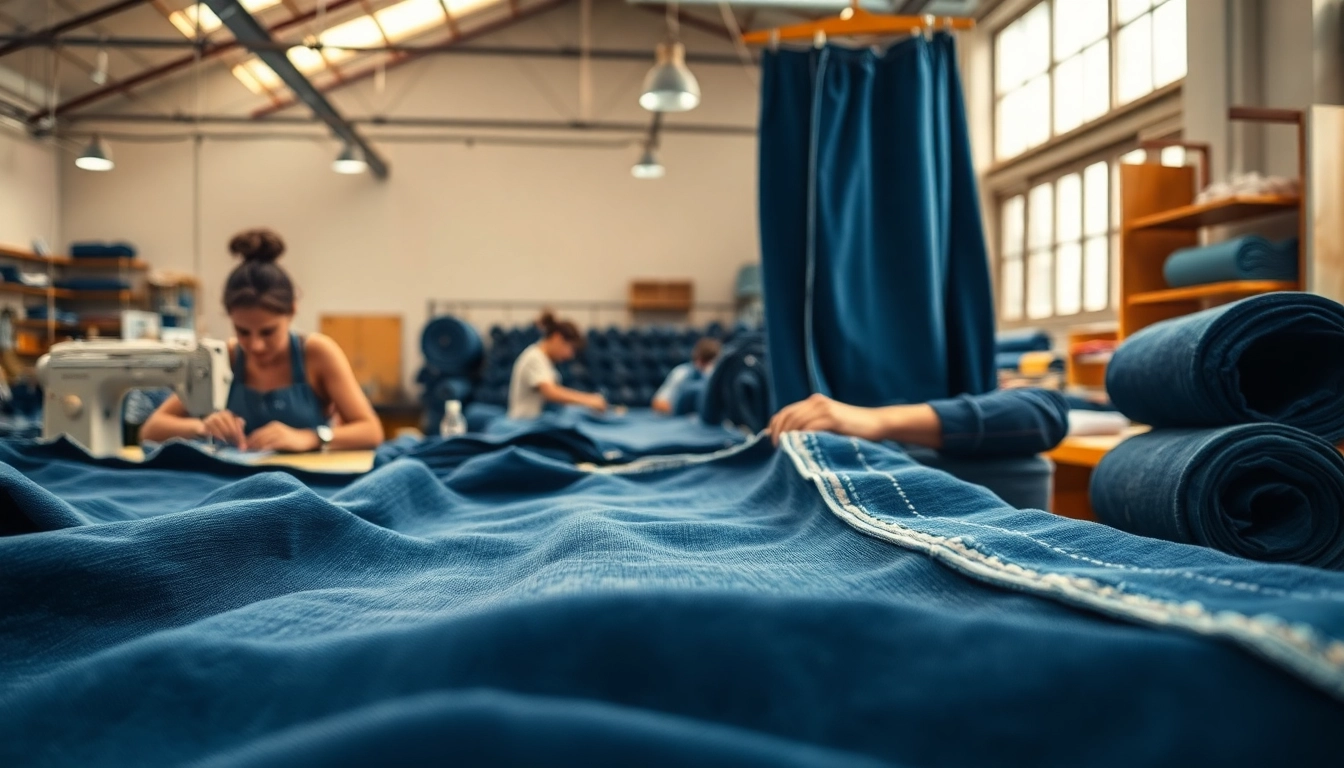Understanding the Role of Jeans Cloth Manufacturers
The jeans industry is a significant segment of the global fashion market, responsible for the production of one of the most popular and widely worn garments—jeans. At the core of this industry are jeans cloth manufacturers, who play a vital role in not only crafting high-quality denim but also influencing fashion trends, sustainability efforts, and economic viability within the textile sector. This article explores the multifaceted world of jeans cloth manufacturers, focusing on their importance, selection factors, current trends, challenges faced, and future prospects.
What Are Jeans Cloth Manufacturers?
Jeans cloth manufacturers are specialized producers involved in the design, fabrication, and distribution of denim fabrics. They vary significantly in size, ranging from large scale industrial plants to smaller boutique workshops. These manufacturers focus on creating denim that meets the specific needs of clothing brands while ensuring that the final product aligns with market demands and quality standards. The manufacturing process involves several complex stages, including spinning, weaving, dyeing, and finishing, each critical to the final quality of the denim.
The Importance of Quality Manufacturing in Denim
Quality manufacturing is fundamental in the denim industry for several reasons. First and foremost, jeans are products that require a significant amount of durability due to the wear and tear they undergo. High-quality denim resists fading, fraying, and wear, ensuring that the end consumer receives a product that stands the test of time. Furthermore, quality fabric affects the comfort and fit of the jeans, with well-manufactured denim offering breathability and stretch where necessary. In a marketplace that values both sustainability and durability, the quality produced by jeans cloth manufacturers can foster brand loyalty and repeat business.
How Manufacturers Impact the Fashion Industry
Jeans cloth manufacturers impact the fashion industry significantly by continuously innovating and responding to consumer demand for styles, fits, and sustainable practices. They collaborate closely with brands to introduce trending styles and offer bespoke options that allow brands to express individuality while also addressing ethical concerns about production methods and sourcing of materials. Manufacturers that adopt sustainable practices, such as utilizing organic cotton or implementing water-saving technologies, enable brands to promote their products effectively in an increasingly eco-conscious marketplace.
Key Factors in Selecting Jeans Cloth Manufacturers
When fashion brands consider partnering with jeans cloth manufacturers, several critical factors come into play to ensure the success of their denim products.
Evaluating Manufacturing Processes
The manufacturing process is crucial in determining the quality and sustainability of denim. Brands should assess the steps taken by manufacturers in terms of efficiency, quality control measures, and labor practices. Understanding the workflow can help brands make informed decisions on their partnerships. Additionally, manufacturers employing advanced technologies in their production, such as automated cutting and sewing processes, can significantly improve efficiency and reduce waste, making them attractive partners for modern brands.
Assessing Fabric Quality and Sustainability
Quality control in manufacturing is vital, but brands must also weigh the fabric quality against sustainability practices. It is essential to inquire about the sourcing of raw materials, the environmental impact of the dyeing and finishing processes, and whether the manufacturer participates in any certifications or industry standards that promote ethical practices. Sustainable production not only appeals to eco-conscious consumers but can also enhance brand reputation and open up market opportunities.
Analyzing Cost-Effectiveness and Minimum Orders
Budget considerations inevitably influence the selection of jeans cloth manufacturers. Brands need to analyze the cost-effectiveness of manufacturing, balancing between achieving high quality and maintaining profitability. Understanding minimum order requirements can also impact this decision. Manufacturers that offer flexibility in order sizes can be advantageous for small to medium-sized brands testing new styles or launching limited collections, allowing them to scale based on market response without significant upfront investment.
Trends in Denim Manufacturing
The denim manufacturing landscape continues to evolve in response to market demands and technological advancements. Following are some of the most impactful trends shaping the industry.
Sustainable Practices in Jeans Production
A pronounced shift towards sustainable practices is evident in the denim industry. Manufacturers are increasingly fabricating jeans using organic cotton, recycled materials, and innovative processes that reduce water and energy consumption. Techniques such as waterless dyeing and laser finishing significantly minimize the environmental footprint of denim production. Brands that partner with manufacturers committed to sustainability can leverage this trend to market their products more effectively to eco-aware consumers.
Technological Advances in Fabric Creation
Technological innovation within the manufacturing process is revolutionizing how denim is produced. Advances such as digital fabric printing, anti-stain treatments, and smart textiles that adapt to temperature or moisture, are examples of how technology can improve denim functionality. Additionally, the adoption of digital platforms for design and production allows for more precise designs and shorter lead times, enhancing responsiveness to fashion trends.
Consumer Demand and Market Trends
Understanding consumer demand is paramount in the denim industry. Shifts toward athleisure and more relaxed fits indicate a need for manufacturers to create versatile denim options that cater to diverse lifestyles. Market research and consumer feedback loops are essential tools for manufacturers to stay ahead of trends and adapt their offerings accordingly. By tapping into emerging consumer preferences, jeans cloth manufacturers can position themselves effectively within the broader fashion landscape.
Challenges Faced by Jeans Cloth Manufacturers
While full of opportunities, the denim manufacturing industry also faces numerous challenges that require strategic solutions.
Supply Chain Disruptions and Solutions
Supply chain disruptions can significantly impact jeans cloth manufacturers, primarily due to changes in global trade dynamics, natural disasters, and the COVID-19 pandemic. Manufacturers must develop more resilient supply chains by diversifying their sourcing tactics, establishing local partnerships, and leveraging technology for better forecasting and inventory management. Building flexibility into supply chains can mitigate risks and improve overall stability when unexpected events occur.
Maintaining Quality Amidst High Demand
High demand presents a dual challenge: maintaining quality while scaling production. Manufacturers may feel pressure to meet quantity targets, sometimes at the expense of quality. Implementing robust quality management systems, continuous staff training, and an unwavering commitment to standards are essential strategies to avoid pitfalls associated with rapid production increases. Brands must communicate their standards clearly to manufacturers to uphold the quality ethos across all products.
Adapting to Fast Fashion Trends
The fast fashion industry continually influences consumer expectations, with rapid design-to-retail cycles becoming the norm. This requires jeans cloth manufacturers to be agiler, capable of responding to trends almost in real-time. Adapting production processes to allow for shorter lead times—while maintaining quality and sustainability—poses a significant challenge. Manufacturers investing in flexible systems and technologies that allow for speedy adjustments can thrive under these conditions, meeting the needs of both brands and consumers.
Future of the Jeans Cloth Manufacturing Industry
As the denim manufacturing sector evolves, several factors will shape its future, emphasizing innovation and market responsiveness.
Innovations Shaping the Future of Denim Production
Looking ahead, innovations such as blockchain technology for tracking fabric origins, AI-driven design software, and automation in production processes are poised to redefine denim manufacturing. By adopting these advancements, manufacturers can increase efficiency, enhance traceability, and improve sustainability efforts—factors increasingly important to modern consumers. Collaborations between technology providers and manufacturers will be pivotal in driving these innovations forward.
Global Market Opportunities and Challenges
The global market for denim is vast, providing opportunities for manufacturers to expand into emerging markets where consumer interest in denim is on the rise. However, challenges such as fluctuating raw material costs, regulatory changes, and shifting consumer demands need to be navigated carefully. Manufacturers who proactively monitor market conditions and adapt strategies accordingly will be more likely to seize the opportunities presented in a competitive landscape.
Strategies for Staying Competitive in the Market
In a competitive environment, jeans cloth manufacturers must prioritize adaptability, quality, and sustainability to remain relevant. Building strong partnerships with brands, investing in workforce training, and fostering innovation can create a robust foundation for success. By continually assessing the evolving market demands and maintaining a focus on quality and ethical practices, jeans cloth manufacturers can thrive in the fast-paced world of fashion.



